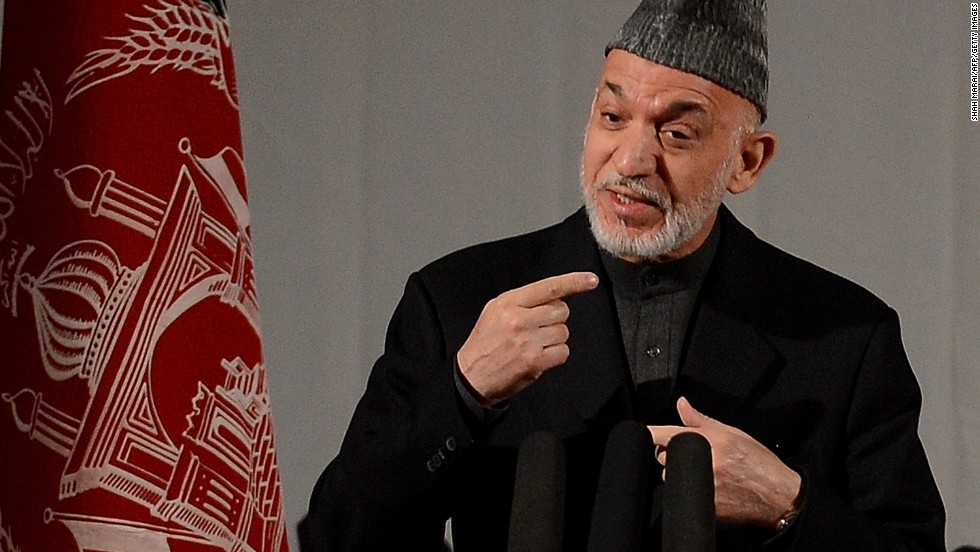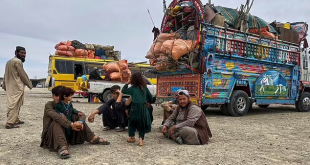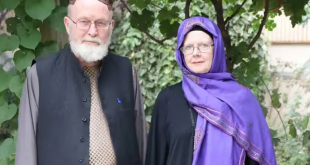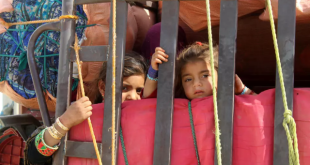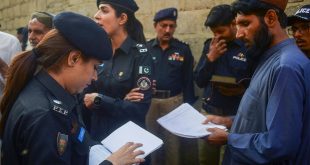“This is a translated version of ex-President Hamid Karzai’s interview with Iran’s Sharq newspaper”
AT: The ex-President of Afghanistan Hamid Karzai started his interview with this sentence: “Feel completely free. Ask whatever you want.” The ex-President of the eastern neighbor of Iran was born in Karz village in southern Kandahar province of Afghanistan. His father was the deputy chief of Afghanistan’s parliament in 1960s and was then killed in Quetta city of Pakistan. Hamid Karzai is a well-known and influential politician in Afghanistan. Though, today he terms himself as a citizen of Afghanistan, but most believe that he plays his leadership role in the national unity government of this country. The ex-president believes that terrorism has no root in Afghanistan. He believes that terrorism sneaked into Afghanistan from abroad.
He also hinted at the international troop policy, particularly the US troops, and stressed that they should not have targeted Afghan houses under the pretext of chasing terrorists. Karzai in his interview told the paper: “His as well as the current government faces numerous challenges. Corruption is one among such biggest challenges. He stressed that he does not deny this fact. Karzai said confidently that this phenomenon (corruption in government offices) had entered into Afghanistan from abroad and had been supported and empowered by foreign hands. Karzai ended his ‘frank’ interview with Sharq with a soft voice and said: “You are kind. Most welcome. Most welcome.”
Q: Mr. Karzai. Your 13 years tenure was ended and you bid adieu to the Presidential Palace (Arg), but some say that Hamid Karzai is a government in shadow. What is your viewpoint on this matter?
A: No. I am not a government in shadow (unseen but felt). I am the ex-president of Afghanistan and today I am at the service of the current government as a citizen of Afghanistan.
Q: Towards the end of your tenure, you highly criticized the presence and the policy of the international troops, in particular the US troops in Afghanistan. Your criticism resulted in postponing the signing of security deal with the US. It is while that you have entered the political era of Afghanistan after the direct interference of American troops. How do you match the two issues?
A: Americans came to Afghanistan after the attack on twin skyscrapers in New York or the 9/11 incident. They played role in freedom of Afghanistan, and helped Afghanistan in overcoming the clandestine invasion, terrorism and presence of the Taliban. We are thankful to them and have maintained their achievement. This was in favor of Afghanistan and no one denies it. The Afghan government and the Afghan nation accept this fact and we thank them for this. The issue that we opposed and I personally opposed as the president of Afghanistan, was the policy of US after the freedom of Afghanistan in past 10 years. Because we knew that terrorism is not in Afghanistan. Terrorism is not in houses and villages of the people of Afghanistan. Terrorism has entered from outside the country. We were telling Americans not to bombard civilian houses in Afghanistan and don’t imprison the Afghan people, don’t build prison, because terrorism is not here.
Our main differences were in the mentioned issues. I was obliged on that time to speak for the defense of Afghans and I had to remind the issues to Americans and now I am happy that I did so. Our difference was on the US policy particularly after 2004 as they started bombarding cities of Afghanistan and harassed people. But we thank Americans for their assistance to us. I thank them for their policy of assisting Afghans in development and reconstruction process, but I am not satisfied and happy with their military policy and I tried to prevent them from implementing it.
Q: It seems as prolonged election process and later delay in cabinet formation have affected the Afghan society. It is said that people have faced with short-time hopelessness and they are faced with lack of salary and other several problems. What do you think that Ashraf Ghani as your successor and Abdullah Abdullah as the CEO of Afghanistan will bear each other at which extent and how long they will have close cooperation under the national unity government?
A: Both the elders, the honorable president and the honorable chief executive of Afghanistan have close cooperation and relations and are trying for stability of the national unity government. I hope that the two leaders introduce the remaining cabinet members to the parliament after the parliamentarians return from vacation.
Q: The most important issue that is debated nowadays is corruption in public offices in Afghanistan. Recently, the new Finance Minister formally informed of corruption in government offices in Kandahar, particularly in customs office. Anyway, the most criticism in this regard goes to the government under your leadership. What do you want to share in defense of the allegations against your cabinet in past 13 years?
A: Well. The government of Afghanistan was faced with several problems in this regard. Afghanistan was a completely fragmented nation. We started everything from new and we started from zero to constitute the Afghan government. On the other hand, international assistance was showered into Afghanistan. No doubt, there was widened corruption in government offices, but the bigger corruption was in donation policy of the international community. This way of distribution of aid to Afghanistan by the international community, particularly US, increased corruption in the country.
We are not denying the fact that there is corruption in government offices in Afghanistan and unfortunately this problem prevails and this is our problem.
Q: The international militant group—ISIS or Daesh has increased its activities in the region and a number of other countries. It seems that this militant group will increase its tactical activities if it failed to act strategically in a country. Considering the closeness of Taliban’s thought with Daesh, unfortunately it will be possible that the militant group pave the group for its activities in Afghanistan. It comes as we believe that security in Afghanistan is not only important and vital for this country but also for all regional countries including Iran. What is your concerns regarding the likely activity and presence of the terrorist group in Afghanistan soil?
A: Daesh is not an Afghan phenomenon. I have no idea whether Daesh is the outcome of Iraq and Syria’s situation or foreign hands are behind creation of this group in that region. It is possible that Daesh will be the complex of Iraq and Syria’s situation and the support of foreign hands, but I want to say with confidence that Daesh is not an Afghan phenomenon. If Daesh has presence in Afghanistan, then there is no doubt that this issue has been brought to Afghanistan from abroad and is supported by foreign hands in the country. There is no place for growth of Daesh in our country. Therefore, if there is any movement under the name of Daesh in Afghanistan, we will have no doubt that this issue will be created and supported from abroad.
Q: Mr. Karzai, relations between Afghanistan and Iran are not only important for the two neighboring countries, but are of importance for the entire region and Iran is in three circles of the government of national unity’s five-circle foreign policy. Keeping the upcoming trip of the Afghan President Ashraf Ghani to Iran in mind, how do you assess the future of relations between Kabul and Tehran?
A: I am optimistic about the future of relations between the two countries. Afghanistan and Iran are to brotherly nations that shares common language, religion, history and cultural similarities. These relations are the relations between two nations. We are confident that the future of this relation will be better and stronger from today. Afghan president is going to pay a visit to Iran and both countries are taking all preparations to make this trip happen.
Q: Your tenure lasted for 13 years and in the same time Iran had three presidents. How was relation between Afghanistan and Iran during presidency of these three leaders of Iran?
A: When I became president of Afghanistan, Mr. Seyyed Mohammad Khatami was president of the Islamic Republic of Iran. Fortunately, our friendly relations were started during his tenure and the then president of Iran laid the foundation stone of cordial relations with Afghanistan. Later, ex-President Mahmoud Ahmadinjad maintained the relations and President Hassan Rouhani also maintained the cordial relations with Afghanistan. We had good relations with the three presidents of Iran. We are thankful of them and particularly, of the people of Iran.
Q: Relations have been strained between Kabul and Islamabad over the past years. General masses are also against Pakistan’s policy towards Afghanistan. However, with formation of the government of national unity and recent reciprocal visits of the officials of the two countries, it seems that relations between the two countries are improving and expanding, but the anti-Pakistan sentiments are still there. What is your point of view about the future of relations between Afghanistan and Pakistan?
A: Pakistani nation, like Iranian nation, are friends of Afghanistan and we are very close. During Afghanistan’s Jihad, Pakistani nation proved to be great friends of Afghanistan. They give shelter to millions of Afghan refugees in their soil. Nations of the two countries have enjoyed friendly ties. We have no grievances with the people of Pakistan, but military and intelligence official of the country. They nurtured extremism and used it as a tool of foreign policy in the region. Afghanistan has suffered a lot from this policy of Pakistan. I hope that Pakistan’s military and intelligence agencies would have realized that an independent and self-reliant Afghanistan is also in their interest. I hope that they will back down from its efforts to bring Afghanistan under their control. It is impossible, world knows that Afghanistan has rendered many sacrifices for its independence before and after 2001. Throughout the history, we never sundered to the United States, the UK and the Soviet Union, then why should we surrender to Pakistan’s army? We will never surrender. I hope that they will realize this and would back down from its previous policy and cooperate with Afghanistan in the peace process and persuade the Taliban to join peace talks with the Afghan government, for it is in the interest of the two countries. We want friendly and cordial relations with Pakistan, but these relations should be between two sovereign states, keeping both countries national interests intact.
Q: As you phrase it, you have started from zero, but 13 years is not a short time. You struggled a lot for development of your country. What are the important achievements made during your tenure in Afghanistan?
A: One of the achievements is that Afghanistan is once again home to all Afghans. People with different ideologies, from all tribal and ethnic groups, men and women returned to Afghanistan and worked for construction of their homeland. During the past 13 years, the flag of Afghanistan waved in the world and Afghanistan established relations with the entire world. Millions of children returned to schools and thousands of youth went to foreign countries like Iran and others to pursue higher education. Afghanistan has roads, highways, free media and political institutions.
Over the past decade Afghanistan painted itself one of countries on cusp of the change. However, these achievements were not possible without the sacrifices of the people of Afghanistan. Afghans rendered many sacrifices. Just few days back 22 Afghan troops martyred in Logar province. No doubt, these achievements were made as result of the sacrifices of our nation.
 Afghanistan Times
Afghanistan Times
